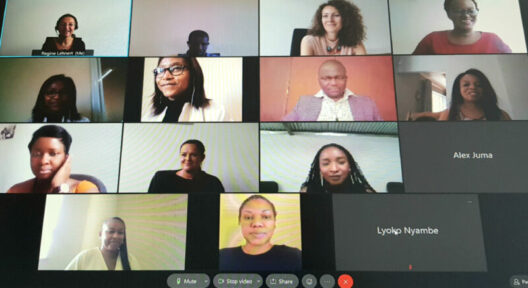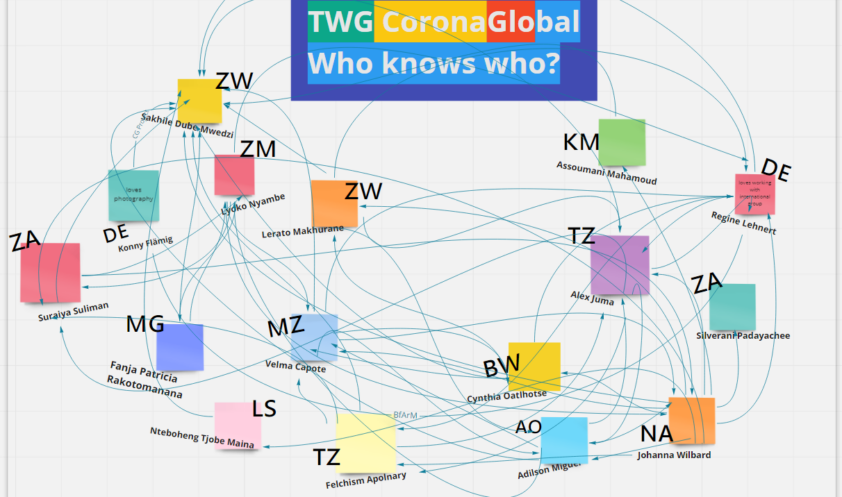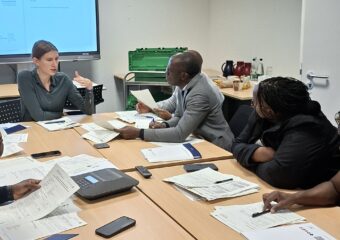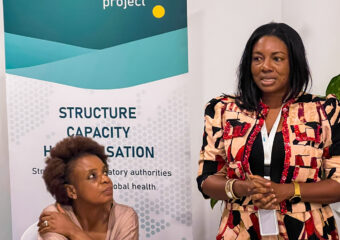Successful Start of the PharmTrain-CoronaGlobal Project: “We like to Share Experiences and Learn from each other”
The three-day online workshop marks the official start of the PharmTrain-CoronaGlobal Project. This is a big step to broaden the regional collaboration of regulatory authorities in southern Africa.

Due to current COVID-19 related travel restrictions, the kickoff workshop of the PharmTrain-CoronaGlobal (PT-CoronaGlobal) project took place as an online event from 27 September to 29 September 2021. In collaboration with the Southern African Development Community (SADC) and the African Union Development Agency (AUDA-NEPAD), the project aims to strengthen the national medicines regulatory authorities (NRMAs) of the SADC region in building structures and capacity. SADC comprises 16 countries including Angola, Botswana, Eswatini, Comoros, Congo (D.R.), Lesotho, Madagascar, Malawi, Mauritius, Mozambique, Namibia, Seychelles, South Africa, Tanzania, Zambia, and Zimbabwe. With a population of about 300 million, it is the biggest economical region on the African continent. Moreover, it is considered to be the most peaceful and stable region in Africa. Nominees from currently eleven NMRAs (Angola, Botswana, Comoros, Lesotho, Madagascar, Mozambique, Namibia, South Africa, Tanzania, Zambia, and Zimbabwe) form the technical working group. The PT-CoronaGlobal Team facilitates its work. With this workshop, the participants laid a solid foundation for the project and agreed on the subsequent steps.

After a brief introduction to the project and getting to know each other, opening remarks were given by Mrs Sakhile Dube Mwedzi, coordinator of the harmonization program of SADC, and Dr Regine Lehnert, PharmTrain project leader. Both emphasized the importance of building structure and capacity in regulatory authorities with regards to developing long-term strategies for the registration of medical products in public health emergencies. In this context, the establishment of a framework that promotes harmonized standards and procedures in the SADC region is crucial for strengthening preparedness in times of health crises. Another key element for successful preparedness is the provision of individual support to regulatory authorities in the implementation of the regulatory guidance for emergency use authorizations. The keynote speech of Dr Alireza Khadem Broojerdi from the Department of Regulation and Prequalification at WHO HQ was the highlight of the first day. His recent publication* “Worldwide assessment of low-and middle-income countries’ regulatory preparedness to approve medical products during public health emergencies” highlighted gaps in countries’ regulatory preparedness considering both structure and capacity. Without a doubt, this was a brilliant starting point for the more in-depth discussions during the kickoff meeting.
A number of informative presentations filled the following day. Each nominee provided an overview of their regulatory authority and its organization including existing emergency use procedures with focus on structures and regulatory capacities. This part of the workshop turned into a productive exchange among the colleagues about experiences made during the COVID-19 pandemic. On the last day of the workshop, the results of the pre-meeting survey and information from the NMRAs’ presentations were summarized with respect to preparedness for health crises, including structures for fast access to promising drug candidates. Furthermore, the WHO-Emergency Use Listing (EUL) procedure was presented describing its scope and aim as well as its structure. The EUL procedure can be divided into three phases: (1) Pre-emergency phase, (2) Emergency phase and (3) Post-listing phase. To begin with, the technical working group agreed to focus on the aspect of the Pre-emergency phase. For increasing efficiency, the group split into three subgroups, with each working on a specific area. Of this work package. The day ended with agreeing on the rules of procedure and further steps. During three intensive days expectations and experiences were exchanged among the group members. Importantly, further steps in the process were agreed bearing in mind, “We like to share experiences and learn from each other” (participant).
*Khadem Broojerdi, A., Alfonso, C., Ostad Ali Dehaghi, R., Refaat, M., & Sillo, H. B. (2021). Worldwide Assessment of Low- and Middle-Income Countries’ Regulatory Preparedness to Approve Medical Products During Public Health Emergencies. Front Med (Lausanne), 8, 722872. doi.org/10.3389/fmed.2021.722872.
Date: January 2022



